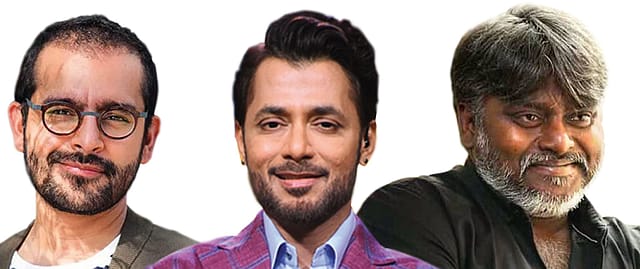Paying It Forward

For someone who is a mere three-films-old—one of which, Gehraiyaan, is releasing this week—Shakun Batra has quite a following. It isn't just because he has assisted directors such as Farhan Akhtar on Don (2006, where he also played the paanwala in the 'Khaike Paan Banaraswala' song) and Abbas Tyrewala in Jaane Tu… Ya Jaane Na (2008, where he also played the second Pappu who can't dance in the iconic song). Or that his second film, Kapoor & Sons (2016), is close to the heart of anyone with a dysfunctional family. It's because of his ascent from the ranks of assistant director to director in what seems to be a dream run. "It's my tribe," says Batra of assistant directors, for whom he started a Facebook group 10 years ago to help them connect for work. "There is a huge need for mentoring in this industry. It's not like medical school where you have a clear growth path. It's so easy to stumble in this industry," he says, adding there is intense pressure to play safe. "You make one mistake and the system just breaks you down," he says. "You have to open up room for originality, to fail if need be. I find it offensive that people here celebrate other people's failures. As long as you make a solid attempt and as long as it is not lazy filmmaking, we need to experiment. That's how you change cinema." Much as the world wants to call him an auteur, he is happy to describe himself as a team player who is eager to share credit with his cinematographer, Kaushal Shah (who shot Mumbai Diaries 26/11), his music director Kabeer Kathpalia, his editor Nitesh Bhatia (who worked with him on his 2021 Netflix documentary Searching for Sheela), and his longtime writing partner Ayesha DeVitre.
Hero of Small Parts
Sometimes, cooking can be a great solace when you're struggling. Nawazuddin Siddiqui recalls cooking in exchange for a place to stay when he didn't have work in Mumbai. Now, Dibyendu Bhattacharya, a year junior to him at the National School of Drama (NSD), tells me how he spent many years being a part-time actor and a fulltime chef after a small breakout role in Mira Nair's Monsoon Wedding (2001). The actor has had a great month, appearing in two important roles in Rocket Boys, the fine series from SonyLIV, and in Looop Lapeta, where he plays, quite fittingly, a restaurant owner with a side business. Bhattacharya believes we are in the middle of a new wave similar to the 1970s which saw the efflorescence of great actors like Naseeruddin Shah and Shabana Azmi, and directors such as Govind Nihalani and Shyam Benegal. The character actors have come into their own, he says, and those with theatrical training are triumphing—he points to the cast of Rocket Boys, where everyone from Jim Sarbh to Ishwak Singh has cut their teeth in theatre. Bhattacharya seems quite serene about his 22-year-long journey in the Hindi film industry which saw him becoming a fixture in niche films, many of which ended up being banned, from the digital films Urf Professor (2001) and Divya Drishti (2002) to Anurag Kashyap's Black Friday (2004). He's had a career of small parts but he feels honoured that he has been part of films that made history, whether it was his debut in Monsoon Wedding as Vijay Raaz's assistant Lottery, or the pigtailed pimp Chunni in Dev.D (2009). Being an actor who comes in from the cold requires patience and perseverance, and Bhattacharya is proof of it paying off, and the ability to relate to every generation. Those in their fifties recall his theatre days in Delhi when he was at the NSD repertory, those in their forties recall his role in Monsoon Wedding, the thirty-somethings love him for Dev.D, and the twenty-something assistant directors and actors praise his work in Netflix's cult hit in 2020, Jamtara – Sabka Number Ayega. What more does an actor need?
Imran Khan: Pakistan’s Prisoner
27 Feb 2026 - Vol 04 | Issue 60
The descent and despair of Imran Khan
Scene That
Anupam Mittal, founder of Shaadi.com, may now be well-known as one of the judges on Sony's Shark Tank India, but he's had a stint on screen before. Two stints, in fact. One as Rad aka Radhakrishna, the desi boy who marries an American in Flavors (2003), and another as a poker player in 99 (2009). Both movies were directed by Raj Nidimoru and Krishna DK in the days when they were still techies from America trying to explore Bollywood. Mittal says when they wrote the character of Rad, it was based on him, so they wanted him to play it, and "I obliged." He co-produced both films with them. Now, of course, Raj and DK are the toast of Bollywood with The Family Man (2019), among other triumphs.
